It’s Caucus Time
How Iowa works.
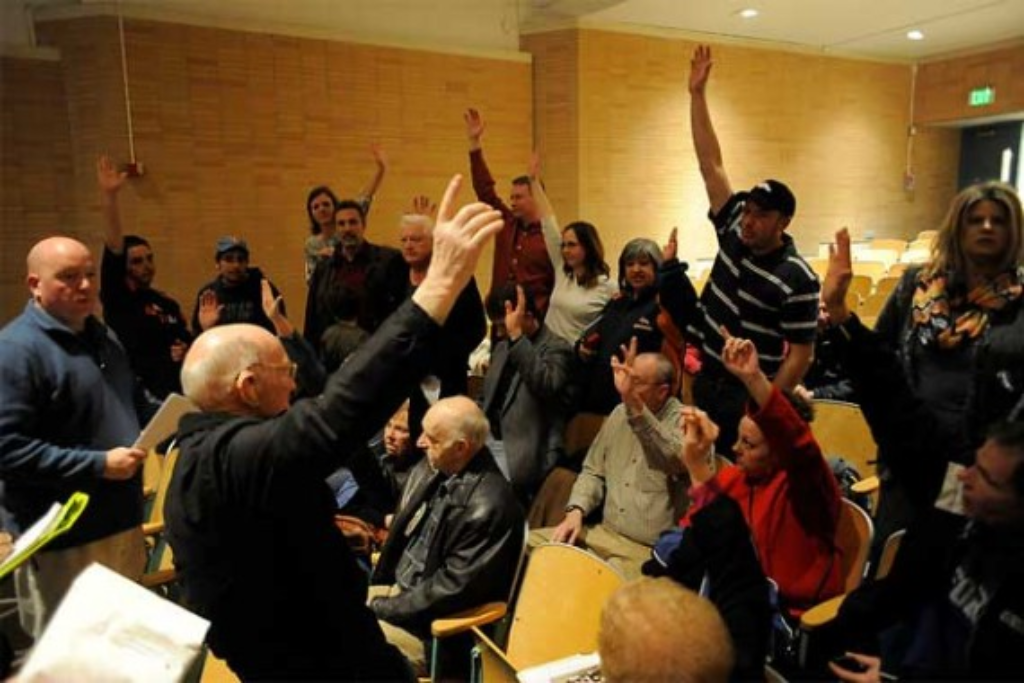
The NYT has a nice animated infographic that explains the Iowa caucuses in excellent detail as part of a piece that further elaborates on the process: How the Iowa Caucuses Work.
This is, of course, one ludicrous* way to influence who the next president of the United States may be. It is a process whose design limits participation and which rewards organizational skills rather than measuring real support statewide. It also privileges people who have the time and inclination to go out to a multi-hour meeting on a Monday night.
And yet, candidates who underperform in this event will face pressure to drop out and will be treated by the media as a loser.
Keep in mind a few facts.
There will be a total of 4,750 delegates at the Democratic National Convention (3,979 pledged delegates and 771 automatic delegates). If a candidate can win 1,990 (or more) pledged delegates on the first ballot, they win the nomination. Iowa has 41 pledged delegates up for grabs tomorrow. That is 1.03% of the total of pledged delegates and 2.06% of the number needed to win. And yet, candidates will be eliminated from the field because of this contest. Others will gain substantial momentum.
Iowa is a wholly unrepresentative state. It has a population of just over 3 million. It lacks major metropolitan areas.** The state is roughly 90% white and only 3.5% African-American. So a party that is oriented towards urban voters and is heavily reliant on a multi-racial coalition is about to shape the party’s choices for a nominee in a low population, more rurally-oriented, monochromatic state.***
And why? Because path dependency rules our politics (we’ve always done it this way and entrenched interests who benefit from the status quo will block change). And because despite being a continental country of over 325 million persons we like to romanticize the notion that retail politics and pancake breakfasts tell us something about managing the federal government.
This is no new lament. But when one looks at the ways in which we first choose nominees, and then choose presidents, it is no wonder we are where we are.
*I am pretty sure that is the exact political science term.
**Google tells me that the Des Moines metro area is ~655,409 and that Des Moines itself is just over 200,000 residents.
***At least the next contest, the New Hampshire primaries, reverses that trend. Wait. What? NH is smaller, whiter, and even less urban? Never mind.


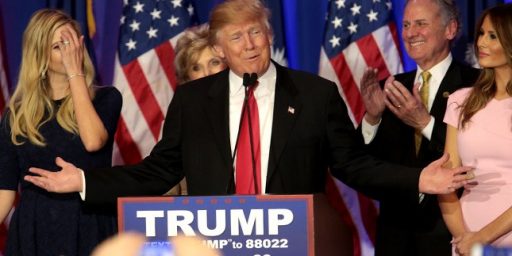
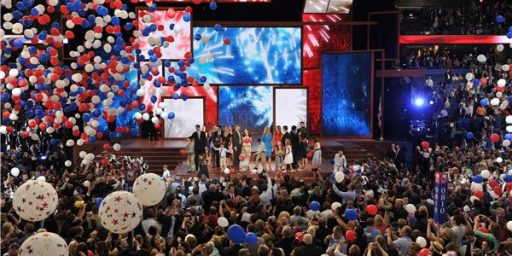
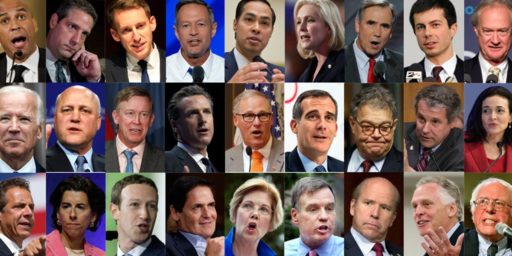
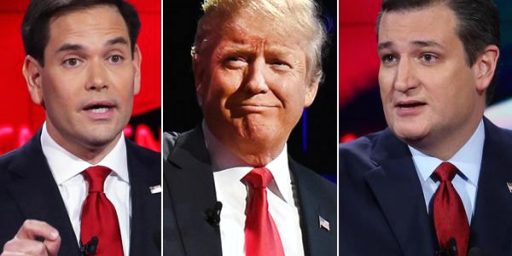
An evergreen post that’s nonetheless worth repeating every four years. It’s a truly weird way to winnow the field.
I call that a village.
But then, I live in a city/metro area of around 21 million people. I’m sure I pass by about as many as a mere 200,000 on the way to a meeting across town, more if I take the subway.
@Kathy: And yet it’s twice the size of South Bend, Indiana, the town of which Pete Buttigieg was until recently mayor.
I don’t see much chance of cyber security breaches here. Maybe they are on to something.
@James Joyner:
I’m guessing that’s larger than a senator’s staff, or a presidential campaign staff. So Major Pete would have had more executive experience than some other present and past candidates.
I far prefer just voting.
Having gone to a single caucus in my life, and listening to my neighbors make statements about why they support various candidates in 2008*, I can say that seeing small d democracy with horse trading and persuasion take place is one of the most horrifying things I have seen.
My neighbors are idiots, and I kept having to see my neighbors after that and pretend that they aren’t idiots.
There was someone who would never vote for another Clinton or Bush, and would vote Republican if Clinton won the nomination. Dumb, but excusable.
There was someone who wouldn’t vote for some b.tch woman.
There was someone who wouldn’t vote for a dumb n-clang.
There was someone who was supporting Obama because he was certain he would get assassinated and that this would pull the country together with a revulsion towards the Republicans. This argument, by the way, persuaded the previous person.
In the end, my precinct sent three delegates to the state convention — one each for Clinton, Obama and Kucinich. The entire afternoon was of no value.
I think now Washington has both a caucus and a primary, but I don’t know which actually chooses delegates. I’ll look into it when it gets closer.
*: I skipped the 2016 caucus because I really didn’t want either Bernie Sanders or Hillary Clinton, but was willing to vote for either in the general. Also, it was a nice day outside.
@Kathy: That’s certainly true. He’s arguably more experienced than Barack Obama was when he was elected. And, certainly, running South Bend is leaps and bounds more preparation than Donald Trump had. Still, it’s rather anomalous. Most modern Presidents have been governors (Bush 43, Clinton, Reagan, Carter, FDR) or Vice President (Bush 41, Nixon, LBJ, Truman) first. Before Obama, only JFK had been a mere Senator as his top job. Eisenhower is also an outlier, but he had run the entire European Theater and then been Chairman of the Joint Chiefs.
@James Joyner: I almost didn’t write it because it really is basically a broken record situation.
I do hope that for 2024, the parties require convention delegates to be selected through a primary and effectively ban caucuses. Second hope for 2024 is that they find 4 smallish states that better represent the parties membership to go first and they need not be the same states.
@James Joyner:
Any honest job is far more preparation than Trump had. In such jobs, people learn to honor responsibilities and pay their bills.
Look at who’s sitting in the oval office. We skipped anomalous and went right to ludicrous over three years ago.
@Gustopher: It was better in the olden days. Back in 1967 my mom worked for the Drug Clerks Union in Seattle and my parents combined income and her employment made it attractive to encourage them to join in the shaping of Democratic politics. (In just 10 short years they had gone from subscribers to the Liberty Lobby news letter to potential movers and shakers in what would become the modern left. Hmmmm…) In any event, my dad ended up at the precinct caucus and reported when he returned that the host had said something to the effect that anyone who wasn’t for “Scoop” Jackson (the 1968 version of Jay Inslee this year) could leave anytime because their candidate wasn’t going to prevail.
As I recall the report, everybody laughed and agreed that they could turn to refreshments time and the discussion of whether someone other than the caucus host was going to be the precinct’s delegate to the county and state conventions. Simpler times when “Democracy in Action” meant something.
@Gustopher:..I think now Washington has both a caucus and a primary, but I don’t know which actually chooses delegates. I’ll look into it when it gets closer.
If I am reading this story (dated April 2019) correctly Washington State will hold a primary election on March 10, 2020.
The Green Papers seem to concur.
As to selection of delegates, I’m more inclined to see caucuses as the ideal way to select the delegates to the county and state party conventions. Then again, I live in an imaginary world in which people actually KNOW their neighbors. In the real world, I suppose that voting for complete strangers in primary elections and selecting complete strangers at coffee klatches are probably about equal and would yield similar enough results.
Although I’m sure that there are reasonable logistical and procedural reasons to argue against it, I would suggest that a single primary election day might be a less gameable system than the one we have now. (Of course, gaming the system might be the feature rather than the bug. 🙁 )
“Caucus time”: time to break out the corn hole games and roulette wheels.
@Just nutha ignint cracker: I’ve been arguing for years for a national primary followed by a run-off. It has disadvantages, in that would be hard for an unknown candidate to break through. But that hasn’t happened since Jimmy Carter and the media environment is rather different than it was in 1976.
As it turns out, Iowa doesn’t work.
@Mister Bluster:..I don’t see much chance of cyber security breaches here. Maybe they are on to something.
Obviously I don’t have a clue.